 Secretary of Iran’s Supreme National Security Council (SNSC) Rear Admiral Ali Shamkhani said the US should respond to global demand on its role in the spread of COVID-19.
Secretary of Iran’s Supreme National Security Council (SNSC) Rear Admiral Ali Shamkhani said the US should respond to global demand on its role in the spread of COVID-19. RNA - Secretary of Iran’s Supreme National Security Council (SNSC) Rear Admiral Ali Shamkhani said that US officials, instead of falsely accusing Iran and China, should respond to the international demands regarding their role in developing and spreading the novel coronavirus.
In reaction to the recent US officials’ statements against Iran, Shamkhani emphasized, “Playing blame games is the US' typical way of evading accountability.”
Instead of accusing Iran and China on false grounds, the US authorities should respond to the international demands with regards to the role of this country in developing and spreading this fatal virus as well as the continuation of crimes committed against Iranian people, Iran's top security official emphasized.
Iran's Health Ministry spokesman announced on Tuesday that the number of people infected with COVID-19 virus has grown to 16,169, while death toll has increased to 988. Meanwhile, 5389 people have recovered.
Novel coronavirus, or COVID-19, is a new respiratory disease first identified in the central Chinese city of Wuhan late last year. The World Health Organization on Wednesday described the outbreak as a pandemic.
According to the latest reports, the novel coronavirus, officially known as COVID-19, has infected over 185,386 people in the world, claiming more than 7,332 lives. However, 79,936 people have recovered.
Last Wednesday, the Iranian foreign ministry declared that despite Washington’s claims of cooperation to transfer drugs to Iran via the new Swiss-launched payment mechanism, the US is troubling the process amid the coronavirus outbreak in the country.
Although US claims that medicines and medical equipment are not under sanctions, they have practically blocked the transfer of Iran’s financial resources in other countries into the Swiss Humanitarian Trade Arrangement (SHTA), Iranian Foreign Ministry Spokesman Seyed Abbas Mousavi said.
As the death toll from the virus surges, Iran intensifies its preventive safety measures. Closures of schools and universities have been extended for the next two weeks.
The government also imposed travel restrictions, specially on Iran’s north, which is among the red zones. The country has also adopted strict digital health control procedures at airports to spot possible infections.
Health Minister Saeed Namaki announced earlier this month that a new national mobilization plan would be implemented across the country to fight against the coronavirus epidemic and more effectively treat patients.
Namaki said that the plan will include all the 17,000 health centers and the 9,000 medical and clinical centers in all cities, suburban areas and villages.
He added that the plan will include home quarantine, noting that infected people will receive the necessary medicines and advice, but they are asked to stay at home.
Namaki said that people with a more serious condition will stay at the hospitals, adding that the public places will be disinfected, the entries of infected towns and cities will be controlled to diagnose and quarantine the infected cases.
According to Fars News Agency, he added that the necessary equipment and facilities have been provided, expressing the hope that the epidemic would be curbed.
Namaki said that the number of medical laboratories to test coronavirus infection has reached 22, and will increase to 40 soon.
The World Health Organization (WHO) says Iran's response to the virus has so far been up to the mark. Still, it says the US sanctions are a big challenge, and Washington would be complicit in the rising death toll in Iran if it would not remove its sanctions.
The World Health Organization has considered priorities in combating coronavirus and Islamic Republic of Iran obeys and follows up priorities as defined by WHO.
The WHO is dispatching separate delegations to all countries.
847/940